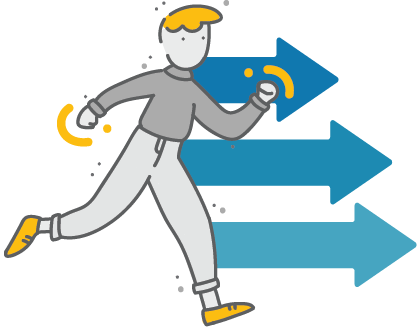Becoming a Self-Manager
Stress Management
Updated Aug 7, 2019
Swipe right to go to the next slide
Stress is a normal response to a difficult situation, and it is commonly experienced following a concussion. Stress symptoms are often a reaction to the negative impact of having an injury. People can be overwhelmed by physical symptoms, the uncertainty of how long recovery will take, and by having to meet the demands of life while feeling unwell.
Learning stress management skills can help you to cope better with your concussion, and can also help with your recovery.

Stress can be caused by challenging experiences, such as being stuck in traffic, not having enough money to pay the bills, or having too many things to do a short amount of time. As previously mentioned, stress is often experienced after a concussion.
So, what is stress?
Stress is actually a complex set of changes that occur in the body, and there are physical, emotional, cognitive, and behavioral aspects of stress.
The diagram shows some common warning signs and symptoms of stress. Click on the diagram to enter into full screen mode. Then, press the Esc key to exit the full screen mode.
Did you notice that many of the symptoms of stress are the same ones you may be experiencing as a result of your concussion?
Symptoms of stress overlap, and can mimic concussion symptoms. Concussion symptoms can also be worsened by stress, and stress can interfere with recovery, so that’s why it’s important to address.
The good news is that there are many ways to better manage stress. Here are some options:
Stay healthy: exercise regularly; eat healthy foods; reduce caffeine and sugar; and get enough sleep.
Relax: calm breathing; practice visualization; or progressive muscle relaxation. If you would like more information on these active relaxation techniques, you can find this in the “Anxiety” article, or you can refer to the Anxiety Canada website at the end of this section.
Restore: take a long bath; listen to music; write in your journal; or go for a walk in nature.
Stay connected: call a good friend; spend time with positive people that enhance your life; or create opportunities to meet new people.
Challenge your thoughts: reframe problems; think about the big picture; and try to avoid words, such as “always”, “never”, “should” and “must” (these are telltale signs of self-defeating thoughts).
If you would like more information on how to challenge your thoughts, you can find this in “Challenge Your Thoughts” article.
If you are interested in learning more about managing stress, select one of these resources to explore more.

Click the button above to toggle between light mode and dark mode. This toggle can also be found in the menu.
Hold
and tap
to zoom in.
Hold
and tap
to zoom out.
Hold
and tap
to zoom in.
Hold
and tap
to zoom out.
On most mobile devices, you can spread to zoom.
Increase your text size in your device settings.
Remember to take regular breaks while exploring MyGuide: Concussion.
Vancouver Coastal Health’s MyGuide Concussion Team would love to hear your feedback! It matters to us and helps to improve the experience for future users. Your responses will be kept anonymous and your privacy is a top priority. To complete a 15-20 minute online survey or request a telephone survey, please click the link below.